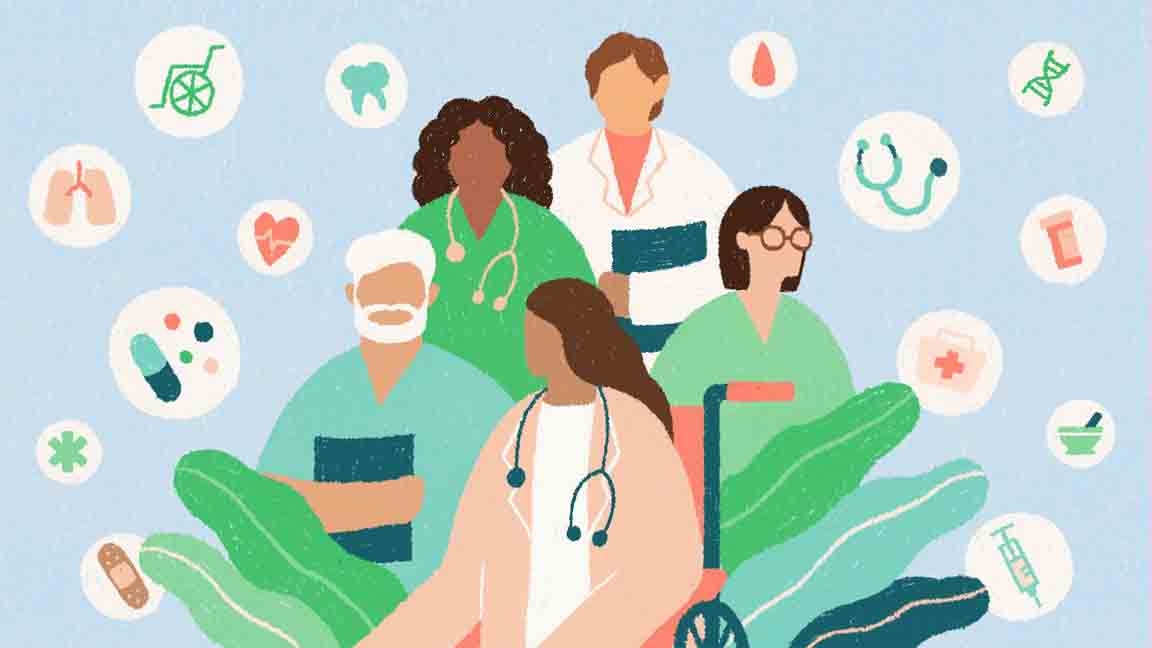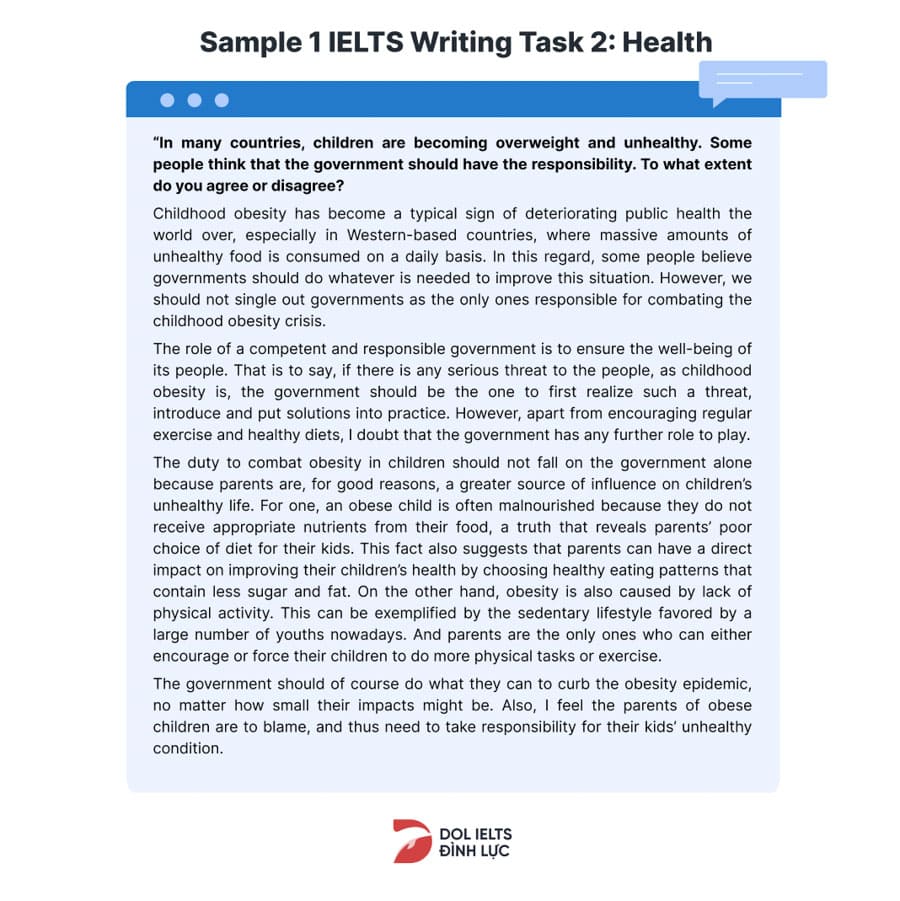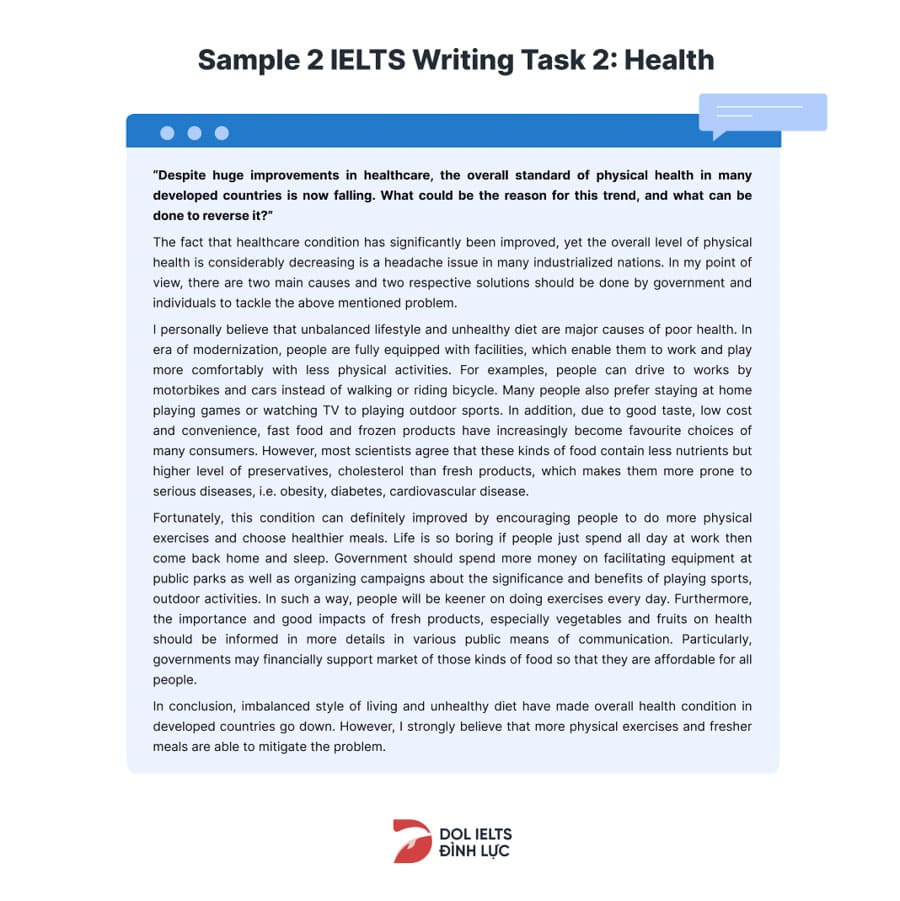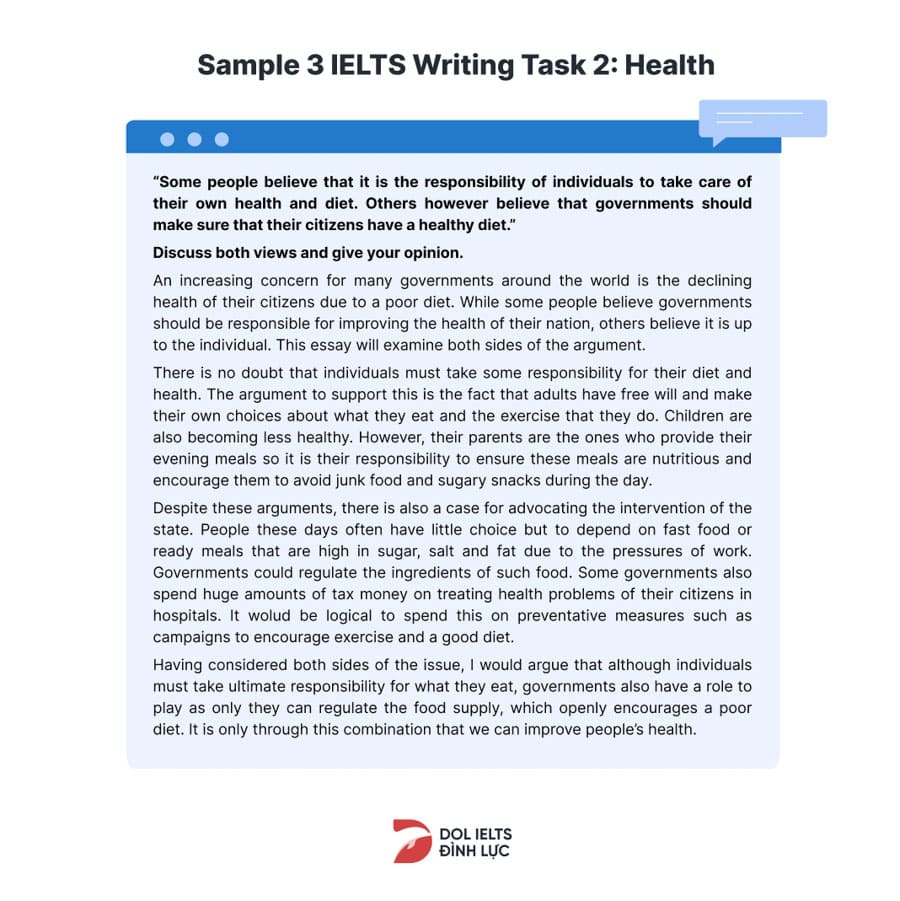IELTS Writing Task 2 chủ đề Health - Từ vựng & bài mẫu
Chủ đề IELTS Writing Task 2 Health là dạng chủ đề khá phổ biến trong các kỳ thi IELTS. Cùng DOL tìm hiểu bài viết sau để đạt được điểm tối đa bạn nhé.
DOL IELTS Đình Lực
May 29, 2024
2 mins read

Table of content
Tổng quan chủ đề IELTS Writing task 2 Health
Từ vựng cho chủ đề Writing Task 2 Health
Một số đề mẫu chủ đề Writing task 2 Health
Câu hỏi thường gặp
Tổng quan chủ đề IELTS Writing task 2 Health
Chủ đề Health vốn dĩ không khó bởi chúng ta bây giờ thường quan tâm đến sức khỏe nên những kiến thức cơ bản thì vẫn luôn có. Nhưng vấn đề lớn của chủ đề này chính là mớ từ vựng lạ lẫm về bệnh hay những dụng cụ y tế, tên các loại thuốc hay cách điều trị làm chúng ta khổ sở loay hoay mãi không xong. Dù vậy thì bạn vẫn nên biết những vấn đề mà chủ đề Health thường xoay quanh mới có thể bắt đầu tìm kiếm các loại từ vựng để học, có những vấn đề cơ bản sau:
Hệ thống bảo hiểm y tế của quốc gia;
Ảnh hưởng của việc ăn kiêng;
Tầm quan trọng của chế độ chăm sóc sức khỏe tư nhân;
Thực phẩm chức năng thay thế;
Ảnh hưởng của căng thẳng/ stress.
Bạn nên tìm nhiều vựng để sẵn cho phần này nếu muốn được band điểm cao, bởi vì những kiến thức về chủ đề Health hiện tại thì không quá chuyên môn hay khó hiểu, cũng không đòi hỏi sự logic, chỉ đơn thuần là một số thường thức đơn giản.
Đừng bao giờ học thuộc lòng bài nói cho một chủ đề. Giám khảo ghét những câu trả lời thuộc lòng và rất dễ dàng để phân biệt chúng. Rất nhiều thí sinh có xu hướng mất logic khi họ quên một từ trong trình tự. Điều này sẽ làm giảm điểm số một cách đáng kể
IELTS Examiner’s Tips An Academic Guide to IELTS Speaking and Writing (by Karolina Achirri)
Bạn có thể tìm hiểu bài viết khác: IELTS Writing Task 2 – Chủ đề Gia đình (Family)
Từ vựng cho chủ đề Writing Task 2 Health
• Chronic disease (noun phrase): bệnh mãn tính; • Fat level (noun phrase): lượng chất béo; • Blood pressure (noun phrase): huyết áp; • Cardiovascular disease (noun phrase): các bệnh tim mạch; • Upbeat (adjective) (informal): vui vẻ, lạc quan; • Brain function (noun phrase): hoạt động não; • Dementia (noun): bệnh mất trí nhớ; • Schizophrenia (noun): bệnh tâm thần; • Infectious disease (compound noun): bệnh lây nhiễm; • Chickenpox (noun): bệnh thủy đậu; • Malaria (noun): bệnh sốt rét; • Lung cancer (noun phrase): bệnh ung thư phổi; • Sore throat (noun phrase): viêm họng; • Bilharzia (noun): bệnh giun chỉ; • Hepatitis (noun): viêm gan; • Tuberculosis (noun): bệnh lao; • Fever virus (noun phrase): sốt siêu vi; • Heart rate (noun phrase): nhịp tim; • Stain (noun): vết ố; • Wrinkle (verb): vết nhăn trên mặt • Sanitation system (noun phrase): hệ thống vệ sinh nước; • Personal hygiene (noun phrase): vệ sinh cá nhân; • Waste (noun): chất thải; • To contaminate (verb): làm ô nhiễm; • To exacerbate (verb): làm nghiêm trọng hơn; • To comply with environmental regulations (verb phrase): tuân theo những luật lệ bảo vệ môi trường; • Health awareness education (noun phrase): giáo dục nhận thức về sức khỏe; • To combat health issues (verb phrase): giải quyết / loại bỏ các vấn đề về sức khỏe; • Life-threatening illness (noun phrase): bệnh gây nguy hiểm chết người; • To act as a deterrent (verb phrase): ngăn chặn; • To opt for a healthier lifestyle (verb phrase): chọn một lối sống lành mạnh hơn; • Allergy (noun): dị ứng; • To be derived from (verb phrase): được chiết xuất từ; • Herb (noun): thảo mộc; • Overdose (noun): quá liều; • Side effect (noun phrase): tác dụng phụ.
Một số đề mẫu chủ đề Writing task 2 Health
Sample 1:
In many countries, children are becoming overweight and unhealthy. Some people think that the government should have the responsibility. To what extent do you agree or disagree?
Childhood obesity has become a typical sign of deteriorating public health the world over, especially in Western-based countries, where massive amounts of unhealthy food is consumed on a daily basis. In this regard, some people believe governments should do whatever is needed to improve this situation. However, we should not single out governments as the only ones responsible for combating the childhood obesity crisis.
The role of a competent and responsible government is to ensure the well-being of its people. That is to say, if there is any serious threat to the people, as childhood obesity is, the government should be the one to first realize such a threat, introduce and put solutions into practice. However, apart from encouraging regular exercise and healthy diets, I doubt that the government has any further role to play.
The duty to combat obesity in children should not fall on the government alone because parents are, for good reasons, a greater source of influence on children’s unhealthy life. For one, an obese child is often malnourished because they do not receive appropriate nutrients from their food, a truth that reveals parents’ poor choice of diet for their kids. This fact also suggests that parents can have a direct impact on improving their children’s health by choosing healthy eating patterns that contain less sugar and fat. On the other hand, obesity is also caused by lack of physical activity. This can be exemplified by the sedentary lifestyle favored by a large number of youths nowadays. And parents are the only ones who can either encourage or force their children to do more physical tasks or exercise.
The government should of course do what they can to curb the obesity epidemic, no matter how small their impacts might be. Also, I feel the parents of obese children are to blame, and thus need to take responsibility for their kids’ unhealthy condition.

Sample 2:
Despite huge improvements in healthcare, the overall standard of physical health in many developed countries is now falling. What could be the reason for this trend, and what can be done to reverse it?
The fact that healthcare condition has significantly been improved, yet the overall level of physical health is considerably decreasing is a headache issue in many industrialized nations. In my point of view, there are two main causes and two respective solutions should be done by government and individuals to tackle the above mentioned problem.
I personally believe that unbalanced lifestyle and unhealthy diet are major causes of poor health. In era of modernization, people are fully equipped with facilities, which enable them to work and play more comfortably with less physical activities. For examples, people can drive to works by motorbikes and cars instead of walking or riding bicycle. Many people also prefer staying at home playing games or watching TV to playing outdoor sports. In addition, due to good taste, low cost and convenience, fast food and frozen products have increasingly become favourite choices of many consumers. However, most scientists agree that these kinds of food contain less nutrients but higher level of preservatives, cholesterol than fresh products, which makes them more prone to serious diseases, i.e. obesity, diabetes, cardiovascular disease.
Fortunately, this condition can definitely improved by encouraging people to do more physical exercises and choose healthier meals. Life is so boring if people just spend all day at work then come back home and sleep. Government should spend more money on facilitating equipment at public parks as well as organizing campaigns about the significance and benefits of playing sports, outdoor activities. In such a way, people will be keener on doing exercises every day. Furthermore, the importance and good impacts of fresh products, especially vegetables and fruits on health should be informed in more details in various public means of communication. Particularly, governments may financially support market of those kinds of food so that they are affordable for all people.
In conclusion, imbalanced style of living and unhealthy diet have made overall health condition in developed countries go down. However, I strongly believe that more physical exercises and fresher meals are able to mitigate the problem.

Sample 3:
Some people believe that it is the responsibility of individuals to take care of their own health and diet. Others however believe that governments should make sure that their citizens have a healthy diet. Discuss both views and give your opinion.
An increasing concern for many governments around the world is the declining health of their citizens due to a poor diet. While some people believe governments should be responsible for improving the health of their nation, others believe it is up to the individual. This essay will examine both sides of the argument.
There is no doubt that individuals must take some responsibility for their diet and health. The argument to support this is the fact that adults have free will and make their own choices about what they eat and the exercise that they do. Children are also becoming less healthy. However, their parents are the ones who provide their evening meals so it is their responsibility to ensure these meals are nutritious and encourage them to avoid junk food and sugary snacks during the day.
Despite these arguments, there is also a case for advocating the intervention of the state. People these days often have little choice but to depend on fast food or ready meals that are high in sugar, salt and fat due to the pressures of work. Governments could regulate the ingredients of such food. Some governments also spend huge amounts of tax money on treating health problems of their citizens in hospitals. It would be logical to spend this on preventative measures such as campaigns to encourage exercise and a good diet.
Having considered both sides of the issue, I would argue that although individuals must take ultimate responsibility for what they eat, governments also have a role to play as only they can regulate the food supply, which openly encourages a poor diet. It is only through this combination that we can improve people’s health.

Một số đề bài khác
“Some people say that the best way to improve public health is by increasing the number of sports facilities. Others, however, say that this would have little effect on public health and that other measures are required. Discuss both these views and give your own opinion.”
“The availability of unhealthy food, such as fast food and junk food, has become more widespread in recent years. What are some of the problems associated with this development and what action can be taken to solve them?”
“In some countries the average weight of people is increasing and their levels of health and fitness are decreasing. What do you think are the causes of these problems and what measures could be taken to solve them?”
“Nowadays, more and more jobs and tasks are done by machines which involve hard physical work. Do the effects of this trend outweigh the negative effects? (Technology)”
“People can live and work anywhere they want to choose, because of improved communication technology and transport. Do the advantages of this development outweigh disadvantages?”
Câu hỏi thường gặp
Gợi ý trả lời: What are 10 ways to stay healthy?
Measure and Watch Your Weight (Đo lường và theo dõi cân nặng của bạn)
Limit Unhealthy Foods and Eat Healthy Meals (Hạn chế thực phẩm không lành mạnh và ăn các bữa ăn lành mạnh)
Take Multivitamin Supplements (Uống bổ sung Vitamin tổng hợp)
Drink Water and Stay Hydrated, and Limit Sugared Beverages (Uống nước và giữ đủ nước, và hạn chế đồ uống có đường)
Exercise Regularly and Be Physically Active (Tập thể dục thường xuyên và hoạt động thể chất)
Reduce Sitting and Screen Time (Giảm thời gian ngồi và sử dụng thiết bị điện tử)
Get Enough Good Sleep (Ngủ đủ giấc)
Go Easy on Alcohol and Stay Sober (Uống rượu nhẹ nhàng và giữ sự tỉnh táo)
Find Ways to Manage Your Emotions (Tìm cách quản lý cảm xúc của bạn)
Use an App to Keep Track of Your Movement, Sleep, and Heart Rate (Sử dụng một ứng dụng để theo dõi chuyển động, giấc ngủ và nhịp tim của bạn)
Gợi ý trả lời câu hỏi: Why should we eat healthy foods essay?
Healthy food does not only impact our physical health but mental health too. When we intake healthy fruits and vegetables that are full of nutrients, we reduce the chances of diseases. For instance, green vegetables help us to maintain strength and vigor. (Thực phẩm lành mạnh không chỉ ảnh hưởng đến sức khỏe thể chất của chúng ta mà còn ảnh hưởng đến sức khỏe tinh thần. Khi chúng ta ăn trái cây và rau quả lành mạnh có đầy đủ chất dinh dưỡng, chúng ta sẽ giảm nguy cơ mắc bệnh. Ví dụ, rau xanh giúp chúng ta duy trì sức mạnh và sức sống.)
Gợi ý trả lời: What are 5 benefits of healthy eating?
Benefits of Healthy Eating (Lợi ích của việc ăn uống lành mạnh)
May help you live longer (Có thể giúp bạn sống lâu hơn)
Keeps skin, teeth, and eyes healthy (Giữ cho da, răng và mắt khỏe mạnh)
Supports muscles (Hỗ trợ cơ bắp)
Boosts immunity (Tăng cường khả năng miễn dịch)
Strengthens bones (Tăng cường xương)
Lowers risk of heart disease, type 2 diabetes, and some cancers (Giảm nguy cơ mắc bệnh tim, tiểu đường loại 2 và một số bệnh ung thư)
Supports healthy pregnancies and breastfeeding (Hỗ trợ mang thai khỏe mạnh và cho con bú)
Helps the digestive system function. (Giúp hệ tiêu hóa hoạt động)
Có những từ vựng phổ biến nào về chủ đề Health trong tiếng Anh?
Balanced diet (chế độ ăn uống cân bằng, điều độ); exercise (tập thể dục); healthy foods (thức ăn có lợi cho sức khỏe); organic food (thực phẩm hữu cơ); vegetarian food (đồ ăn chay); processed food (thực phẩm đóng hộp); junk food (đồ ăn vặt); fast food (đồ ăn nhanh); healthy lifestyle (lối sống lành mạnh); engage in sports (tham gia hoạt động thể thao); to avoid evils (tránh thói quen xấu); intense workout (tập luyện cường độ cao); to lose weight (giảm cân);...
Để một lần có thể nhồi nhét hết tất cả từ vựng và kiến thức cho một chủ đề đầy sự mới mẻ này là một điều không thể. Thế nên bạn hãy cố gắng luyện não hàng ngày, xem từ sách hay báo chí để bớt nhàm chán hơn, hoặc bằng nhiều cách khác học từ vựng về chủ đề Health mỗi ngày mới giúp cho bạn nhớ sâu hơn. Bởi vì dạng từ vựng của chủ đề IELTS Writing Task 2 Health là dạng khó nhớ nhất và ít tiếp cận nhất. Chúc bạn thành công với những lời khuyên từ DOL nhé!
Ngoài ra, còn có một số chủ đề IELTS Writing Task 2 khác thường xuất hiện.
Table of content
Tổng quan chủ đề IELTS Writing task 2 Health
Từ vựng cho chủ đề Writing Task 2 Health
Một số đề mẫu chủ đề Writing task 2 Health
Câu hỏi thường gặp

